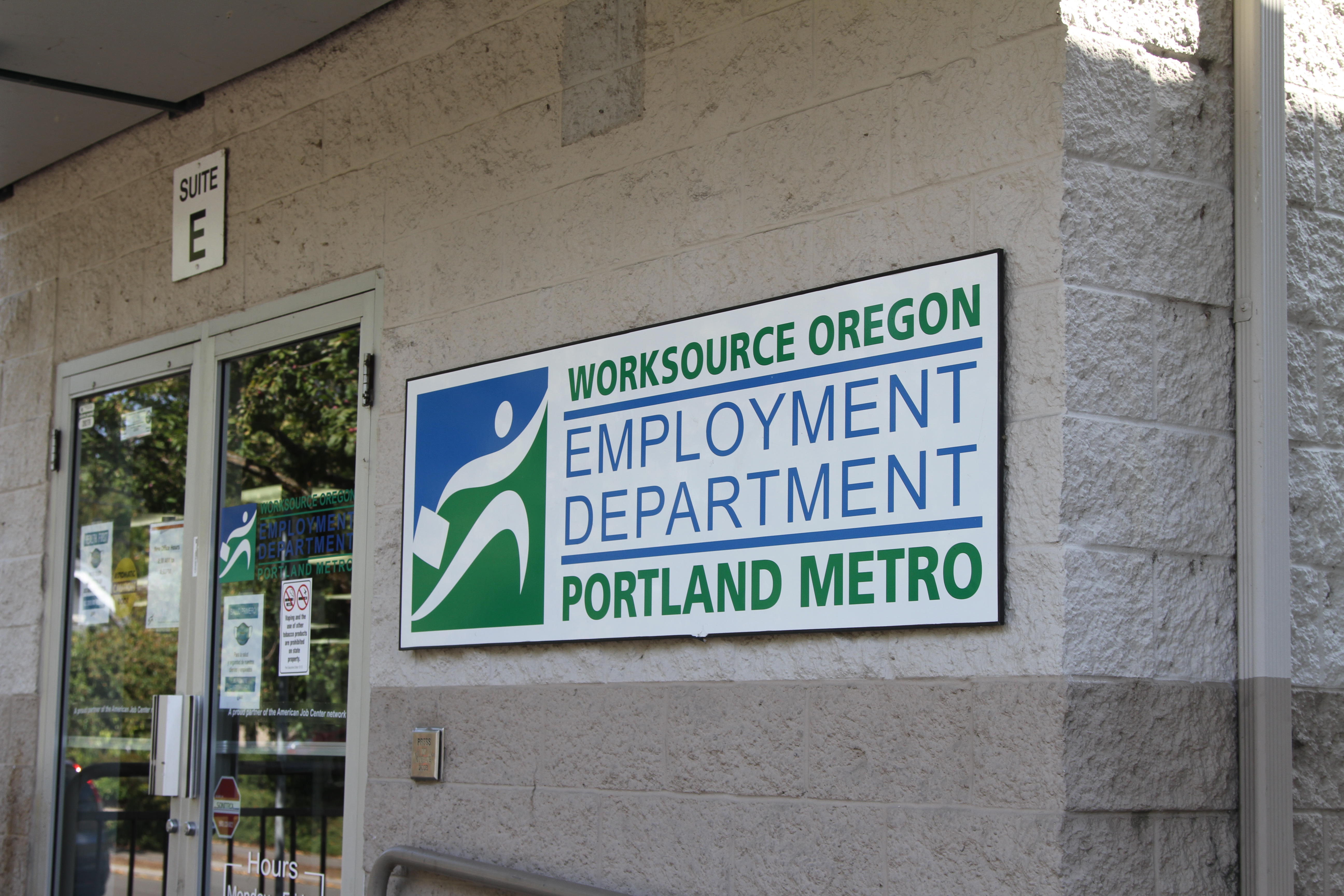
A job center in North Portland. Federal pandemic unemployment benefits expire Sept. 4, 2021.
Kate Davidson / OPB
Roughly 80,000 Oregonians are expected to lose their unemployment payments when federal pandemic benefits expire Sept. 4. That’s about two-thirds of the Oregonians receiving benefits as of mid-August.
Tens of thousands more could see their weekly payments decrease sharply.
Federal payments were a lifeline for hundreds of thousands of Oregonians during the pandemic — including many who normally wouldn’t qualify for benefits.
“I didn’t have to worry as much about the fact that I had lost a ton of my income and was now required to be home 24/7 with my children,” said Portland resident Briana Linden, a contract worker in arts education. “It’s really nerve-wracking to think that that one tiny piece of stability is ending.”
As of mid-August, the Oregon Employment Department paid out roughly $64 million per week in federal benefits — money that went into people’s pockets and the state economy.
The cutoff means self-employed people across the state will have to rebuild their businesses during the delta surge without access to a weekly safety net. Most people who exhausted state benefits and moved onto a federal extension program will see their payments end as well. Laid-off workers receiving regular benefits will have their weekly pay cut, too, as a $300 federal supplement expires.
Oregon’s economy is recovering. The state added 20,000 jobs in July and the unemployment rate fell to 5.2%. Wages have risen and the number of people collecting unemployment has fallen. But the federal benefits cutoff comes during a period of uncertainty, as the delta variant floods Oregon hospitals with record numbers of COVID-19 patients.
“We know there’s a lot of anxiety with the temporary federal benefit programs expiring Sept. 4, even as COVID-19 numbers are increasing in Oregon and across the country,” said David Gerstenfeld, acting director of the Oregon Employment Department.
The agency’s projections of how many people could be impacted by expiring benefits were based on data from mid-August. Those numbers could decrease as more people find jobs.
Here’s a look at the main programs ending and a few of the lives affected.
Federal Pandemic Unemployment Compensation, or FPUC
This is the extra $300 per week in federal money that people have received in addition to their base benefits.
Roughly 120,000 Oregonians could lose that cushion after Labor Day.
Larry Taylor is one of them.
The 66-year-old social worker made it through some of the darkest days of the pandemic with his job intact. Made it through the mass layoffs when the pandemic hit. Made it through the winter shutdowns.
Then, in June, he was laid off. He started collecting regular unemployment, including the $300 bonus. It wasn’t until speaking with OPB that he learned that boost was ending.
“It helped. It was needed,” Taylor said outside a job center in North Portland. “I don’t know why they discontinued it.” He said the change would hurt a lot of people.
After Sept. 4, Taylor’s weekly benefits will be cut almost in half — to roughly $340 a week, after taxes. His concerns about money aren’t new, but now they’ve grown.
“I got a mortgage to pay. I was always concerned. Even when I was working, I was concerned,” Taylor said. “So, this is going to be a little hardship. I just got to cut back on things.”
Pandemic Unemployment Assistance, or PUA
For Portland resident Briana Linden, the world changed when Gov. Kate Brown shut down schools in March 2020.
“It was really terrifying because we were suddenly facing a global pandemic and I was facing the loss of all of my income and I was home with my children,” she said.
Linden is a teaching artist who pieces together different jobs. Much of her work involves schools and students, including the statewide Poetry Out Loud contest she typically coordinates.
Congress had workers like Linden in mind when it created Pandemic Unemployment Assistance for people who usually can’t get regular unemployment insurance benefits, including the self-employed.
Linden and roughly 36,000 other Oregonians are expected to lose benefits when PUA expires Sept. 4.
For Linden, those federal benefits were a lifeline. She said she and her husband come from working class families and would have struggled to make it on his pay alone.
“Those benefits made it so we got food on the table for our kids,” she said. She was also able to save some money.
In mid-August, Linden didn’t have paying work lined up yet. And she worried about her young children’s return to in-person schooling during the delta surge.
“It’s hard to not think we’re going to have another shutdown,” she said. “And to not have benefits on top of all of those other stresses — honestly, I feel like I can’t even imagine how we’re going to keep doing this. It feels really, really debilitating.”
Pandemic Emergency Unemployment Compensation, or PEUC
This program extended benefits for people who ran out of regular unemployment benefits.
About 45,000 Oregonians stand to lose those extended benefits entirely after Sept. 4.
Shirley Halnan expects to be one of them.

Shirley Halnan was laid off from a job in the design industry last year. She plans to launch her own business as federal pandemic unemployment benefits expire.
Kate Davidson / OPB
After Halnan was laid off from a job in interior design, she exhausted her regular benefits and eventually moved onto PEUC.
She said federal benefits did more than pay her mortgage and bills. She saved a bit and took online classes. Halnan is starting her own coaching business — and planning to reinvent herself, even as she approaches retirement age.
“I always bounce back,” she said with a rasp in her voice. Halnan’s asthma makes the prospect of returning to an office or working in people’s homes unnerving.
“I don’t feel safe. Period,” she said. She’s upset that more people haven’t gotten vaccinated to help curb the pandemic.
“I’m not angry at my losing my benefits. I’m frustrated and appalled at the fact that I don’t feel safe going to work,” she said.
About 11,000 people currently receiving PEUC should be able to keep receiving benefits. The employment department said this group has been informed they can shift back to a regular unemployment claim.
Halnan said no one from the agency notified her about the possibility of benefits continuing, but she plans to seek clarification.
What happens next?
In 2019, roughly 860,000 people visited food pantries or meal sites in Oregon and Southwest Washington, according to the Oregon Food Bank.
In 2020, that number doubled to 1.7 million people — a figure the group’s CEO called “absolutely staggering.”
“We have been through the highest surge in hunger in my lifetime,” said Susannah Morgan.
In 2021, she said, the number of people requesting food assistance stabilized and began to decline.
“We’re worried what will happen when these benefits expire. Are we going to see another surge in hunger again?” Morgan asked.
In short, she doesn’t know.
Morgan pointed to other federal and state programs that could help offset the benefits cliff. The Biden administration is pumping billions more into SNAP benefits, a historic investment poised to increase Oregonians’ food stamp benefits by 27% over pre-pandemic levels. And eligible families with children are temporarily receiving monthly payments, up to $300 per child, under an expanded child tax credit.
But many low-income households in Oregon are still struggling to get rent relief as eviction protections for renters end. As of Aug. 26, more than 30,000 households had applied for help from the Oregon Emergency Rental Assistance Program.
Barely one-tenth of those applicants — 3,200 households — had been paid.
At the same time, job vacancies have been at historic highs in Oregon and staffing shortages are widespread. The role of enhanced unemployment benefits in that labor shortage has been hotly debated. With the $300 federal supplement, some workers earned more on unemployment than they did in their former jobs.
In its recent economic forecast, the Oregon Office of Economic Analysis said unemployment insurance has been a clear disincentive for some workers to return to jobs. But “even as UI is a big, maybe the biggest piece to the labor supply puzzle,” state economists wrote, “it is not the only piece.”
Those economists say the expiration of enhanced benefits is unlikely to produce a sudden flood of job applicants in Oregon. Preliminary reports from around the country indicate that states that cut off federal benefits programs early did not experience rapid job growth relative to states that kept the benefits.
It’s more likely, state economists say, that some households will draw down savings first and the labor supply will pick up modestly in the months ahead — potentially as conditions grow safer.
In North Portland, Larry Taylor wasn’t waiting. He’s been applying for jobs and doing some contract work on the side.
“I’m a survivor,” he said. “I’ll find a way to make ends meet.”

